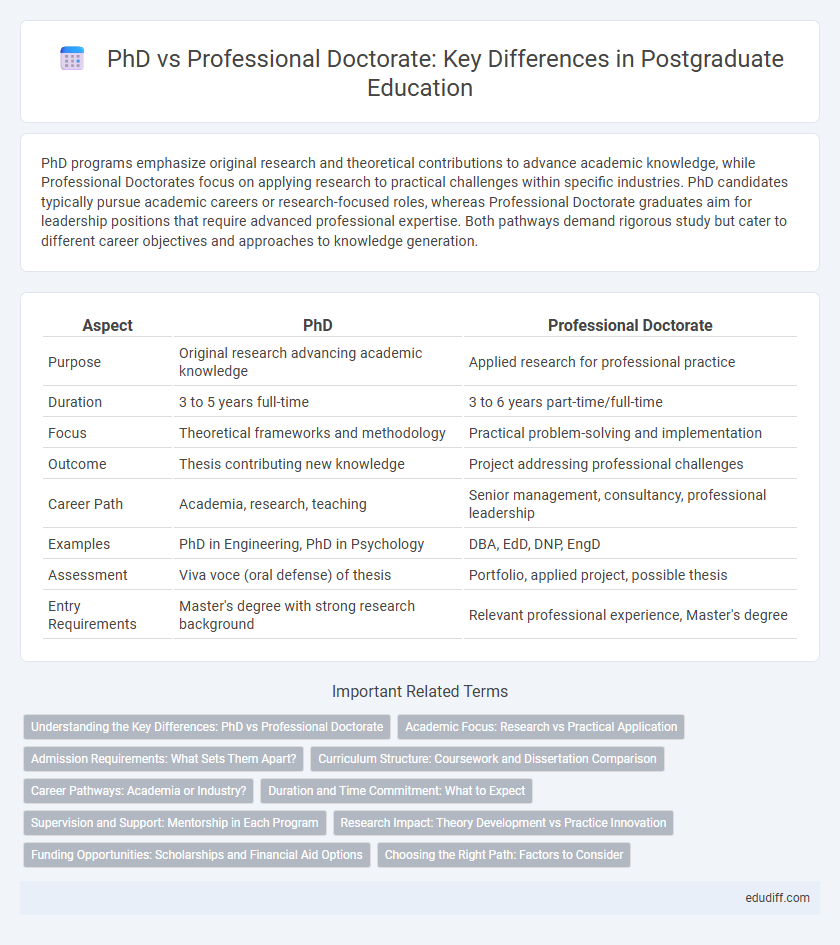PhD programs emphasize original research and theoretical contributions to advance academic knowledge, while Professional Doctorates focus on applying research to practical challenges within specific industries. PhD candidates typically pursue academic careers or research-focused roles, whereas Professional Doctorate graduates aim for leadership positions that require advanced professional expertise. Both pathways demand rigorous study but cater to different career objectives and approaches to knowledge generation.
Table of Comparison
| Aspect | PhD | Professional Doctorate |
|---|---|---|
| Purpose | Original research advancing academic knowledge | Applied research for professional practice |
| Duration | 3 to 5 years full-time | 3 to 6 years part-time/full-time |
| Focus | Theoretical frameworks and methodology | Practical problem-solving and implementation |
| Outcome | Thesis contributing new knowledge | Project addressing professional challenges |
| Career Path | Academia, research, teaching | Senior management, consultancy, professional leadership |
| Examples | PhD in Engineering, PhD in Psychology | DBA, EdD, DNP, EngD |
| Assessment | Viva voce (oral defense) of thesis | Portfolio, applied project, possible thesis |
| Entry Requirements | Master's degree with strong research background | Relevant professional experience, Master's degree |
Understanding the Key Differences: PhD vs Professional Doctorate
PhD programs emphasize original research contributing new knowledge to the academic field, typically culminating in a dissertation, while professional doctorates focus on applying advanced knowledge to practical problems within specific industries. PhD candidates generally pursue careers in academia or research, whereas professional doctorate graduates often advance in professional practice or leadership roles. The key difference lies in the PhD's theoretical research orientation compared to the professional doctorate's practice-based approach.
Academic Focus: Research vs Practical Application
PhD programs emphasize original research aimed at contributing new knowledge to academic fields, requiring a dissertation that advances theoretical understanding. Professional Doctorates prioritize practical application within specific industries, integrating research with real-world problem-solving to enhance professional practice. The choice between the two depends on whether the goal is academic scholarship (PhD) or applied expertise (Professional Doctorate).
Admission Requirements: What Sets Them Apart?
PhD programs typically require a strong academic background with a master's degree, research proposal, and evidence of scholarly potential, emphasizing original research capability. Professional Doctorate admission focuses on extensive professional experience, relevant qualifications, and the ability to apply advanced knowledge in practical settings. These distinct requirements reflect a PhD's research orientation versus the Professional Doctorate's practice-based emphasis.
Curriculum Structure: Coursework and Dissertation Comparison
PhD programs emphasize original research culminating in a dissertation that contributes new knowledge to the field, with minimal coursework focused on research methodologies. Professional Doctorates incorporate a balanced curriculum combining advanced coursework relevant to practical applications and a dissertation or project addressing real-world problems. The curriculum structure of Professional Doctorates integrates applied learning and research, while PhDs prioritize theoretical exploration and scholarly research.
Career Pathways: Academia or Industry?
PhD programs primarily prepare candidates for careers in academia, focusing on original research and scholarly publication, which are essential for university faculty roles. Professional Doctorates emphasize applied knowledge and skills tailored to industry needs, facilitating leadership positions in sectors such as healthcare, engineering, and business. Graduates with a PhD often pursue postdoctoral fellowships and tenure-track positions, while Professional Doctorate holders typically advance in professional practice and executive management within their fields.
Duration and Time Commitment: What to Expect
PhD programs typically require 3 to 7 years of full-time study, emphasizing original research and dissertation completion, while Professional Doctorates often take 3 to 6 years and balance advanced coursework with applied projects. Time commitment for PhDs involves extensive research phases and potential teaching responsibilities, whereas Professional Doctorates integrate practical work aligned with professional settings. Candidates should anticipate a flexible but demanding schedule tailored to research depth or professional practice objectives.
Supervision and Support: Mentorship in Each Program
PhD programs emphasize independent research under the guidance of a faculty supervisor who provides mentorship focused on developing scholarly inquiry and original contributions to knowledge. Professional Doctorate programs offer structured support with supervisors often acting as mentors to integrate practical skills and applied research aligned with industry standards. Both pathways include personalized supervision, but PhD mentorship centers on academic rigor, while Professional Doctorate mentorship prioritizes professional development and real-world application.
Research Impact: Theory Development vs Practice Innovation
PhD programs emphasize theory development by advancing original research that contributes to academic knowledge and scholarly discourse. Professional doctorate programs prioritize practice innovation, applying research to solve real-world problems and improve professional practices within specific industries. Both pathways generate research impact, but PhDs focus on conceptual frameworks while professional doctorates drive actionable change in applied settings.
Funding Opportunities: Scholarships and Financial Aid Options
PhD programs often offer a wider range of funding opportunities, including research assistantships, teaching assistantships, and merit-based scholarships, which can significantly reduce tuition costs and provide stipends. Professional doctorate programs tend to have fewer scholarships and rely more on employer sponsorships or personal funding, reflecting their applied focus and shorter duration. Prospective students should carefully evaluate available scholarships and financial aid options specific to their discipline and institution to maximize funding potential.
Choosing the Right Path: Factors to Consider
Choosing between a PhD and a Professional Doctorate depends on career goals, research interests, and industry requirements. A PhD emphasizes original research and academic contributions, ideal for those pursuing careers in academia or research-intensive roles. Professional Doctorates focus on applied knowledge and practical skills, aligning with leadership positions and advanced professional practice.
PhD vs Professional Doctorate Infographic

 edudiff.com
edudiff.com